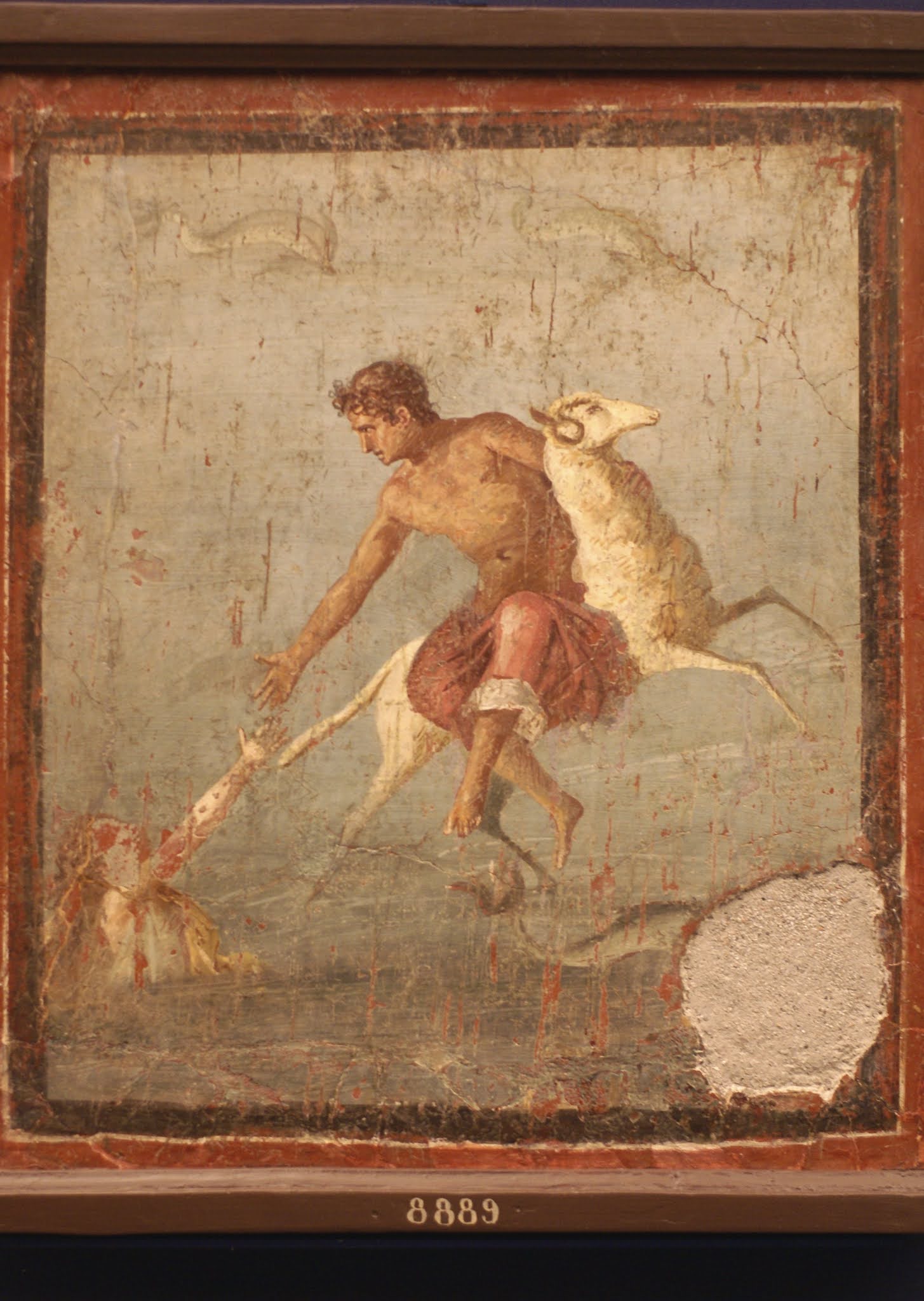Phrixos and Helle, ancient Roman fresco from Pompeii 45-79 CE
"When April shall have six days left, the season of spring will be in mid course, and in vain will you look for the Ram of Helle, daughter of Athamas; the rains will be your sign, and the constellation of the Dog will rise.
On that day, as I was returning from Nomentum to Rome, a white-robed crowd clocked the middle of the road. A flamen was on his way to the grove of ancient Mildew (Robigo), to throw the entrails of a dog and the entrails of a sheep into the flames. Straightway I went up to him to inform myself of the rite. Thy flamen, O Quirinus, pronounced these words: “Thou scaly Mildew, spare the sprouting corn, and let he smooth top quiver on the surface of the ground. O let the crops, nursed by the stars of a propitious sky, grow till they are ripe for the sickle. No feeble power is thine: the corn on which thou hast set thy mark, the sad husbandman gives up for lost. Nor winds, nor showers, nor glistening frost, that nips the sallow corn, harm it so much as when the sun warms the wet stalks; then, dread Goddess, is the hour to wreak thy wrath. O spare, I pray, and take thy scabby hands from off the harvest! Harm not the tilth; ‘tis enough that thou hast the power to harm. Grip not the tender crops, but rather grip the hard iron. Forestall the destroyer. Better that thou shouldst gnaw at swords and baneful weapons. There is no need of them: the world is at peace. Now let the rustic gear, the rakes, and the hard hoe, and the curved share be burnished bright; but let rust defile the arms, and when one essays to draw the sword from the scabbard, let him feel it stick from long disuse. But do not thou profane the corn, and ever may the husbandman be able to pay his vows to thee in thine absence.” So he spoke. On his right hand hung a napkin with a loose nap, and he had a bowl of wine and a casket of incense. The incense, and wine, and sheep’s guts, and the foul entrails of a filthy dog, he put upon the hearth – we saw him do it. Then to me he said, “Thou askest why an unwonted victim is assigned to these rites?” Indeed, I had asked the question. “Learn the cause,” the flamen said. “There is a Dog (they call it the Icarian dog), and when that constellation rises the earth is parched and dry, and the crop ripens too soon. This dog is put on the altar instead of the starry dog, and the only reason why this happens is his name.”
-Ovid, Fasti Book 4, April 25
 |
| Phrixos and Helle, ancient Roman fresco from Pompeii 45-79 CE. |
 |
| J. C. Andrä: “Griechische Heldensagen für die Jugend bearbeitet”. Berlin: Verlag von Neufeld & Henius, 1902 book illustration of the fresco. |
Source:
https://commons.wikimedia.org/wiki/File:Phrixos_und_Helle.jpg
https://de.wikipedia.org/wiki/Datei:Affreschi_romani_-_Pompei_-_Frisso_ed_Elle.JPG
https://www.flickr.com/photos/hen-magonza/4171041533/in/photostream/
https://www.pinterest.fr/pin/459507968234299244/
Quote:




Comments
Post a Comment